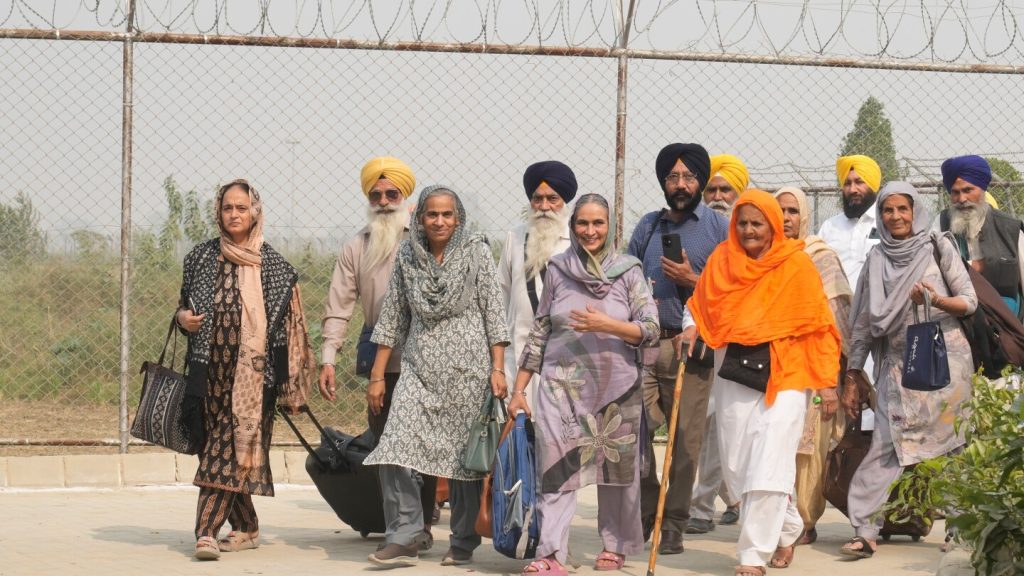Listen to the article
More than 2,000 Sikh pilgrims from India crossed into eastern Pakistan on Tuesday to participate in celebrations marking the birth of Guru Nanak, the founder of Sikhism. The pilgrimage represents the first significant people-to-people contact between the two nuclear-armed neighbors since their brief military confrontation in May.
Pakistani authorities reopened the Wagah border crossing, which had been closed for months due to heightened tensions following the border conflict. Government official Nasir Mushtaq confirmed that the crossing was specifically reopened to accommodate the religious pilgrims.
“Granting visas to Sikh pilgrims and reopening the border demonstrates Pakistan’s respect for religious minorities and commitment to fostering cultural ties, despite ongoing political disputes,” Mushtaq said.
Upon arrival in Lahore, the pilgrims began their journey to Nankana Sahib in Punjab province, home to the shrine of Guru Nanak. The site holds profound significance for Sikhs worldwide as the birthplace of their religion’s founder.
The pilgrimage occurs against a backdrop of historically strained relations between Pakistan and India. The latest escalation began in April when India accused Pakistan of supporting militants who killed 26 tourists in an attack in Indian-administered Kashmir. Pakistan vehemently denied these allegations and called for an international investigation into the incident.
In the aftermath, both countries significantly downgraded diplomatic relations, sealed border crossings, and exchanged military strikes across their shared border. The situation threatened to spiral into a broader conflict until U.S. President Donald Trump reportedly brokered a ceasefire between the two nations.
Despite the pause in military actions, normal diplomatic relations, trade, and civilian movement between the countries have yet to be fully restored. The permission granted for this religious pilgrimage represents a notable exception to the otherwise closed borders.
Sikhs constitute a small minority within Pakistan’s predominantly Muslim population. However, Pakistan contains several historically significant Sikh religious sites, including Nankana Sahib and the Gurdwara Darbar Sahib in Kartarpur, which opened in 2019 with a special corridor allowing Indian Sikhs to visit without visas.
The annual pilgrimage holds special importance this year as it provides a rare channel of direct engagement between the two populations during a period of heightened governmental tensions. Religious pilgrimages have historically served as bridges during difficult diplomatic periods between the two South Asian nations.
Regional security experts view the pilgrimage as a potential small step toward normalizing relations, though significant hurdles remain. Bilateral ties between India and Pakistan have experienced numerous cycles of limited engagement followed by renewed tensions since their independence from British rule in 1947.
“While allowing the pilgrimage is a positive gesture, it represents a humanitarian exception rather than a fundamental shift in relations,” said Dr. Aisha Khan, an international relations expert at Lahore University. “Both governments still maintain hardline positions on core issues including Kashmir, terrorism, and bilateral trade.”
The pilgrims will participate in several days of religious ceremonies and community gatherings at Nankana Sahib. Pakistani authorities have implemented enhanced security measures to ensure their safety throughout the visit.
This religious exchange occurs as both countries continue to navigate their complex relationship while facing significant domestic challenges, including economic pressures and political uncertainties. Whether this limited religious opening might lead to broader diplomatic engagement remains uncertain as the region’s two largest powers continue their cautious coexistence.
Fact Checker
Verify the accuracy of this article using The Disinformation Commission analysis and real-time sources.




8 Comments
While the political climate between India and Pakistan remains complex, it’s encouraging to see them come together to enable this important religious event. Hopefully, this can lead to further constructive dialogue and cooperation.
The reopening of the Wagah border for this religious event is a positive step. Allowing pilgrims to visit their holy sites helps build trust and people-to-people connections between the two countries.
Absolutely. Cultural and religious exchanges can serve as an important bridge, even amidst political differences.
I’m curious to learn more about the significance of Nankana Sahib and its role in Sikh history and faith. The birthplace of Guru Nanak must hold immense spiritual meaning for the Sikh community.
It’s heartening to see religious and cultural exchanges between India and Pakistan, despite ongoing political tensions. The annual Sikh pilgrimage to Nankana Sahib is an important tradition that promotes understanding and goodwill.
Agreed. Preserving and respecting religious heritage sites is crucial for fostering peaceful coexistence in the region.
This pilgrimage is a reminder of the shared cultural and religious heritage between India and Pakistan. Facilitating such events is an important step towards fostering greater mutual understanding.
Absolutely. Preserving these cultural links despite political tensions is crucial for promoting regional peace and harmony.